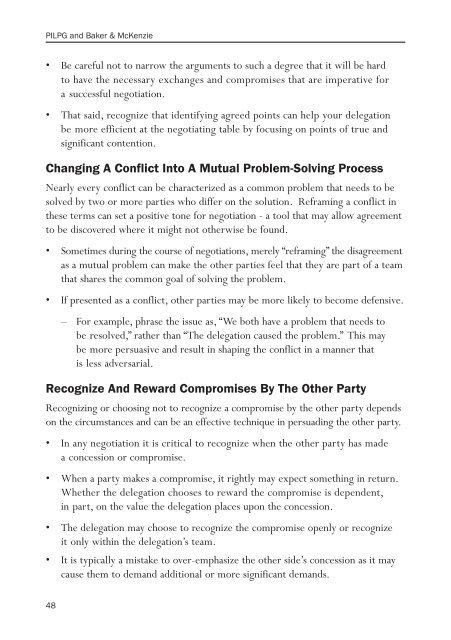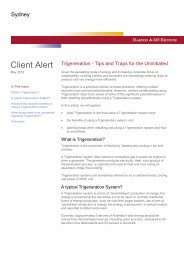The International Negotiations Handbook - Baker & McKenzie
The International Negotiations Handbook - Baker & McKenzie
The International Negotiations Handbook - Baker & McKenzie
Create successful ePaper yourself
Turn your PDF publications into a flip-book with our unique Google optimized e-Paper software.
PILPG and <strong>Baker</strong> & <strong>McKenzie</strong><br />
• Be careful not to narrow the arguments to such a degree that it will be hard<br />
to have the necessary exchanges and compromises that are imperative for<br />
a successful negotiation.<br />
• That said, recognize that identifying agreed points can help your delegation<br />
be more efficient at the negotiating table by focusing on points of true and<br />
significant contention.<br />
Changing A Conflict Into A Mutual Problem-Solving Process<br />
Nearly every conflict can be characterized as a common problem that needs to be<br />
solved by two or more parties who differ on the solution. Reframing a conflict in<br />
these terms can set a positive tone for negotiation - a tool that may allow agreement<br />
to be discovered where it might not otherwise be found.<br />
• Sometimes during the course of negotiations, merely “reframing” the disagreement<br />
as a mutual problem can make the other parties feel that they are part of a team<br />
that shares the common goal of solving the problem.<br />
• If presented as a conflict, other parties may be more likely to become defensive.<br />
– For example, phrase the issue as, “We both have a problem that needs to<br />
be resolved,” rather than “<strong>The</strong> delegation caused the problem.” This may<br />
be more persuasive and result in shaping the conflict in a manner that<br />
is less adversarial.<br />
Recognize And Reward Compromises By <strong>The</strong> Other Party<br />
Recognizing or choosing not to recognize a compromise by the other party depends<br />
on the circumstances and can be an effective technique in persuading the other party.<br />
• In any negotiation it is critical to recognize when the other party has made<br />
a concession or compromise.<br />
• When a party makes a compromise, it rightly may expect something in return.<br />
Whether the delegation chooses to reward the compromise is dependent,<br />
in part, on the value the delegation places upon the concession.<br />
• <strong>The</strong> delegation may choose to recognize the compromise openly or recognize<br />
it only within the delegation’s team.<br />
• It is typically a mistake to over-emphasize the other side’s concession as it may<br />
cause them to demand additional or more significant demands.<br />
48

















